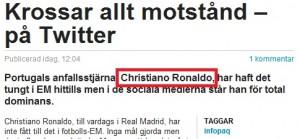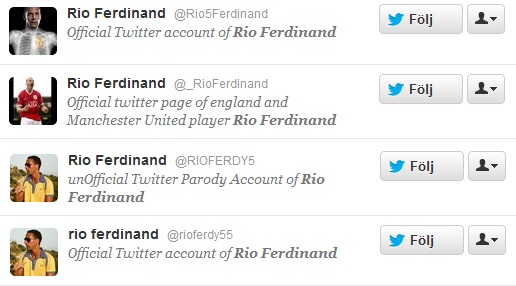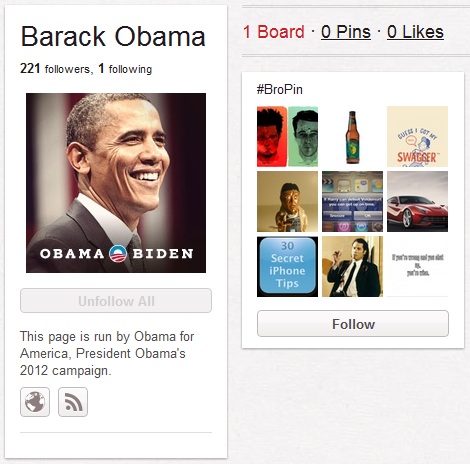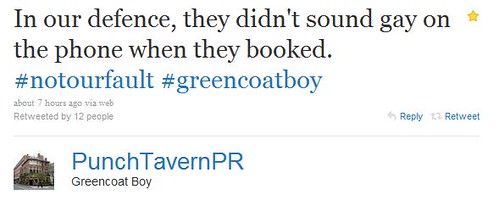I just read an article (in Swedish) today about the top EURO 2012 football players in social media. It reveals that Portugal’s Cristiano Ronaldo is the footballer with most followers on Twitter and Facebook, in total 56 million followers (10.3 on Twitter and 45.9 on Facebook). Add to that the he also has 6.6 million followers on the Chinese equivalent to Twitter, Tencent Weibo.
The article doesn’t link to the official accounts of the sports stars, which is why I decided to write this blog post. You see, the correct accounts are sometimes very hard to find, especially on Twitter and certainly when media like Dagens Media misspell their names.
I see three main reasons for this.
The first is that many celebrities have had their real names “brandjacked” by people pretending to be them, forcing them to make up Twitter handles that are, well, “creative”. For example, Manchester United defender (not in the EURO 2012 for controversial reasons) Rio Ferdinand’s Twitter handle is @rioferdy5 instead of the anticipated @rioferdinand (which is not active). Ferdinand would have no trouble taking over the handle with his real name if he wanted to. I have done that myself for several well known brands.
The second reason it is hard to find the official accounts is that neither Twitter nor Facebook have especially good search engines of their own. Sometimes you may get the best result, but not always. A third reason is that Twitter is not doing much to remove fake accounts that pose as official. A search on Twitter for “Rio Ferdinand” displays a number of fake “official” accounts. The one with the handle “RIOFERDY5” is actually not the same as “rioferdy5” since the “I” is in fact the letter “L”.
The inability to be sure that an account is an official account causes a lot of unnecessary confusion, especially for the celebrities when media sometimes quote fake tweets. Italian Serie A club AC Milan tweeted that a fake account was in fact the official one by Zlatan Ibrahimovic, one of its star players. There is still a lot of confusion around if he even has an account, a PR agency once confirmed that they run one account on behalf of him or his team, but Ibrahimovic himself seems oblivious to the fact that he is on Twitter.
Ferdinand’s team mate Wayne Rooney used to be know as @Wazzaroon08 on Twitter, but is now @WayneRooney.
Another uncertain account is that of Leo Messi, the world’s top footballer. Certainly a player like him, who has 36 million Facebook fans, would have more than some 90,000 followers on Twitter? But his own club, FC Barcelona, is following one account (@messi_barcelona) that should be the official one, one would assume. It has only 93,000 followers and if you click on the link in the bio, you get a warning message from bit.ly, saying this link is potentially not safe to click (I haven’t clicked, so I don’t know if it is safe). The account has only tweets automatically published via Twitterfeed, so by the looks of it, this is not the real deal.
Then again, is the @FCB account really an official account for the club? Seems so, because @andresiniesta8 is following it.
This confusion is not good for anyone, so Twitter should take more responsibility for removing fake accounts and maybe we as users can be more active in reporting them. Then again, the option we have is to report accounts for spamming, and that’s not really what this is about, so they label on that button may deter many from reporting these accounts. Celebrities and brands on the other hand, should be more active in trying to get their accounts labelled “verified”, which I still see as the best proof that an account belongs to an official source.




